- Home
- Lois Lowry
Anastasia Krupnik Page 3
Anastasia Krupnik Read online
Page 3
"Listen, Jennifer, do you think I'm going to become a Catholic and get a name like Anastasia Perpetua Krupnik and not let people know about it?"
Anastasia went home. She wanted to tell her parents about her decision to become a Catholic, but she knew that she had to tell them at the right moment, in the right way, because it would be something of a surprise. They might even be a little upset, she suspected, that she was changing her name.
So she waited until they were seated at the kitchen table for supper, waited until her mother had served the stewed chicken, and then she stood up and said, "Look." She began to sign herself with the sign of the cross, the way Jennifer MacCauley had showed her. She got mixed up and realized she was doing it backwards.
"Wait a minute," she said. Then she said aloud, thinking, "Forehead. Belly button. Left nipple. Right nipple." She did it again, correctly.
Her parents looked at her, puzzled.
"That's terrific, Anastasia," her father said, finally. "Look at mine." He stood up and said, "Nose. Stomach. Left ear. Right ear." He touched them in that order and sat back down. Her mother shook her head as if she thought they were both crazy.
"Daddy," said Anastasia angrily, "don't make fun of me. I was doing the sign of the cross. I'm going to become a Catholic."
"You're what?" said her mother.
"That is both interesting and preposterous," said her father, and began eating his chicken.
"I am too," said Anastasia. "First, I'm going to the church on Saturday with Jennifer, and talk to the guy there about picking up my dispensation."
"Oh?" said her mother, with interest.
"And then I'm going to catechism classes. I'm not sure how many I have to go to."
"Oh?" said her father.
"And then I have to get a wedding dress, and then I make my First Holy Communion."
"A wedding dress?" asked her mother.
"Yes. They make them in small sizes for Catholics."
"And then?"
"Well, you may not like this part much. But then I change my name. I will be Anastasia Perpetua Krupnik."
Her parents looked at each other thoughtfully, and then they both looked at Anastasia.
"And that's it?" asked her father.
"Yes. Then I'm a Catholic."
"You know," said Anastasia's mother, "most people, making an important decision like that, would discuss it first with their parents."
Anastasia looked pointedly at her mother's middle, which was beginning to bulge slightly so that she had left the button at the top of her jeans undone. "Most people," she said to her mother, "making an important decision like that would discuss it first with their child."
They each took a bite of chicken. Finally Anastasia's father said, "You're going to church Saturday, you said? To pick something up?"
"Yes, my dispensation. I'll show it to you when I get home."
"Fine. I suggest that we don't really need to discuss this any more now. We'll wait till Anastasia has been to the church and talked to the, ah, the guy there, about everything."
They all nodded. Anastasia's mother passed the peas around again, and they began to talk about names, in general. Dr. Krupnik said that the funniest name he knew of was that of a new Harvard instructor in Economics: Weatherly Scarf.
Mrs. Krupnik said that Weatherly Scarf wasn't as funny as the name of a model who had once posed for Life classes when she was an art student. The model had been named Felicity Brest.
Anastasia thought that neither of those names was as funny as the name that she was going to name their new baby in March. But she didn't say that.
And no one said anything at all about the name Anastasia Perpetua Krupnik.
It was raining on Saturday, but Anastasia wore her best dress anyway, underneath her yellow slicker, and carried a large Lord and Taylor's shopping bag, just in case she needed it for carrying the dispensation home.
She and Jennifer MacCauley walked along Brattle Street toward St. Cecilia's Catholic Church.
"I never knew before that Catholics went to church on Saturday," Anastasia said. "I thought only Jewish people did that."
"Oh," said Jennifer, "we're not really going to church today. We go to church tomorrow, on Sunday. But on Saturday we go to confession. That's where we're going now, to confession."
Anastasia looked at Jennifer and giggled. "Confession? That's just for criminals, like when they're in the police station and the cops talk to them for a long time, and maybe beat them up a little; then they finally confess."
"Well, this is sort of the same thing, only there's no police or anything, and they don't put you in jail. You just go to the church and confess your sins."
"I won't have to do that part. Because I don't have any sins."
"You do, too. Everybody does. They don't have to be big sins, like murdering anybody."
"I don't have any little sins, either."
"Liar. You told me you stole Mary Ellen Bailey's cupcake out of her lunchbox last week."
"A cupcake? That's a sin?"
"Yeah."
"If I'm a Catholic I have to confess about a cupcake?"
Jennifer nodded. "And also if you think bad thoughts about anyone."
Anastasia stood very still for a moment on Brattle Street. "What if in bed at night I wish that Mrs. Westvessel would get a disease that would make pimples grow all over her face?"
Jennifer thought about that. "Yes," she stated, finally. "That would be a sin, to wish that."
"So I'd have to confess it?"
Jennifer nodded. They had started to walk again, and had almost reached St. Cecilia's Church. It took up the entire next block, and had stained glass windows of people looking terribly sad, some of them with arrows sticking out of their stomachs.
"And," said Jennifer, "you would have to say that you were sorry."
"Sorry?"
Jennifer nodded primly. "Most heartily sorry," she said.
"Even if I'm not?"
Jennifer looked a little embarrassed. "Well," she said, "if you're a good Catholic, you really will be sorry."
Anastasia stopped where she was, on the sidewalk near the corner. She looked at her Lord and Taylor's shopping bag.
"Jennifer," she said, "my bag has a rip in the bottom. I don't think it'll hold the dispensation well."
Jennifer looked into the bag, at the small rip in the bottom. "Yeah," she said doubtfully.
"So I think I'll go on home."
"Yeah," said Jennifer. "I understand."
"Mom?" called Anastasia, when she let herself into the apartment.
Her mother was in the room where she painted, standing in front of the easel with a long smear of pale yellow paint across the front of her shirt, right where the baby was beginning to make a small mound.
"Mmmmm?" answered her mother.
"Have you bought my wedding dress yet?"
"Nope. Not yet." Mrs. Krupnik looked at her canvas carefully, and changed a tiny stroke of yellow with a narrow brush,
"Well, forget it," said Anastasia. "I've changed my mind."
4
"I have fallen in love," Anastasia told her parents one morning at breakfast. It made her feel a little shy to talk about it. But she felt that her parents ought to know.
Her father blew a ripple into his coffee thoughtfully. "You seem a little young for that," he said.
"No, Myron," said Anastasia's mother. "She isn't too young at all. I myself fell in love for the first time when I was ten." She blushed a little.
"You did? With whom?" Anastasia's father always knew the right time to say whom. Anastasia had not yet mastered that.
"His name was Edward Mark." She blushed a little more.
"Edward Mark what?" asked Anastasia's father. Both of them seemed to have forgotten Anastasia altogether.
"That was all. Mark was his last name."
"Well, that's ridiculous. How on earth could you have gotten involved with someone who had two first names?"
"Myron, I w
as not, as you so crudely put it, 'involved.' I was simply in love. It was Platonic. Edward Mark and I played Monopoly together."
That interested Anastasia. She happened to know that her mother was not a very good Monopoly player. "Did Edward Mark get into building hotels?" she asked.
"If you were going to get involved with a hotel magnate," said Anastasia's father, "why didn't you make it Conrad Hilton?"
"I'm not going to talk about it anymore," said Mrs. Krupnik primly. "This is an unproductive conversation." She began clearing the table.
Myron Krupnik sipped his coffee and looked at his watch.
"Well," said Anastasia finally, "wouldn't you like to know whom it is that I'm in love with?"
"Who," said her father. "Use the nominative in that instance."
"Who it is," Anastasia corrected herself. "Who it is, is Washburn Cummings."
"How on earth could you have gotten involved with someone who has two last names?" asked her mother grouchily. But she was talking to Anastasia's father.
"Will you people please listen to me for a change? I am in love with Washburn Cummings. That's important. Washburn Cummings is in the sixth grade. Washburn Cummings is black. Is it going to bother you guys if I get involved with someone who is black? And who is older than me?"
"Older than I," corrected her father automatically.
"Older than I."
Anastasia's mother was standing by the sink. She very often made speeches while standing by the sink. "I don't care if you get involved with someone who is black, or in the sixth grade. I just don't want you to get involved with someone who is insensitive, or who is wont to trespass on the inviolate memories of childhood in a way that is completely lacking in charity or compassion."
"I don't know what you're talking about," said Anastasia. "Washburn Cummings doesn't trespass on anything as far as I know. Once he got kicked out of the movies, though, for being loud and obnoxious."
Neither of her parents said anything. They were glaring at each other.
"Well, listen, you guys," said Anastasia. "Maybe we could talk about it later. I have to go to school now."
She went to get her jacket. As she buttoned it up, she went back to the doorway of the kitchen. "Washburn Cummings," she said, "is the same height as me. I mean, as I. But his hair is about two feet higher than that. So altogether, counting his hair, he is about as tall as you, Daddy."
"That's interesting," said her father, who hadn't really been listening.
"Edward Mark," said her mother loudly, measuring out the words very carefully, "had the most beautiful head of golden curls I have ever seen in my life."
"Well, that's just terrific," said Myron Krupnik, rubbing his hand over his own head which had not had very much hair for a very long time. "I hope he's had a wonderful career modelling for Breck shampoo."
Anastasia walked to school, not at all certain that her parents had grasped the significance of being in love for the first time.
Washburn Cummings, in all honesty, did not even know that Anastasia existed.
But everyone at the J. Henry Bosler Elementary School knew about Washburn Cummings. On the day that he came to school wearing a tee shirt with an obscene saying printing across the front, and was sent home by the principal to change, Washburn Cummings made a quick trip around the J. Henry Bosler Elementary School, appearing briefly at the door of each classroom and opening his jacket to flash the tee shirt at the class. By the time that the principal heard he was doing it, Washburn Cummings had flashed every classroom down through the second grade and was already heading down the front steps, bouncing an imaginary basketball and wiggling his hips.
"Who was that?" asked Mrs. Westvessel with a puzzled look on her face, after Washburn Cummings had appeared in the door.
"That was Washburn Cummings," said the whole class.
"And what was written on his shirt?" she asked.
No one answered. A few people giggled.
"Who are my speed readers here?" asked Mrs. Westvessel. "Mary Ellen Bailey? Robert Giannini? Someone must have been able to read that tee shirt."
Mary Ellen Bailey blushed. Robert Giannini, who always carried a briefcase to school, went up to Mrs. Westvessel's desk and whispered into her ear.
Mrs. Westvessel blushed. "Well," she said. "Well. My goodness. Let's take out our arithmetic books, class."
On the way home from school, walking with Jennifer MacCauley, Anastasia wiggled her hips and bounced an invisible basketball.
"Anastasia," said Jennifer. "That's disgusting."
"No, it isn't. It's just a thing you do to be cool. Anyway, I'll tell you a secret. I'm in love with Washburn Cummings."
Jennifer groaned. "How do you know? How can you tell when you're in love?"
That was something that Anastasia had thought about a great deal. She had stood in the corner drugstore, reading a questionnaire called "Is it really love?" in Cosmopolitan until the pharmacist, Mr. Belden, had said, "Pay for it or close it up, girlie." Short of money, overdrawn on her allowance, she had had to close it up; but she remembered some of the questions.
"You think about him all the time. You stop wanting to see other men. You..."
"You never see any other men anyway," Jennifer interrupted.
"Quiet. He appears in your dreams, usually as a hero. You..."
Jennifer interrupted again. "Washburn Cummings appears in your dreams? As a hero?"
"Yeah. I dreamed the other night that I was lost. I was walking on Huron Avenue, and I couldn't find my house anywhere. Then Washburn Cummings appeared, coming out from behind a tree, and offered to show me the way home."
"Ha. Was he wiggling his rear?"
"No. He was being very kind. And he was wearing a cowboy hat."
"Washburn Cummings's hair wouldn't fit under a cowboy hat."
"Well, in my dream it did. Maybe he'd had a haircut. Let me finish about being in love. You find yourself wanting to fulfill his fantasies..."
"What are fantasies?"
"Imaginations."
"Oh, great. What are Washburn Cummings's imaginations, do you think?"
"Well, one time I saw him on the playground with a transistor radio, and he was just sitting there listening, with a happy look on his face."
"To what? A Red Sox game?"
"No. It was Roberta Flack. I figure maybe he really likes Roberta Flack. I find myself wanting to fulfill his fantasy about Roberta Flack. I'm practicing singing."
"You can't sing. You didn't even make Glee Club."
"Only because she put me in the alto section, and in This Land Is My Land' we had to sing a different tune from the rest of you. I can't do that. But I can sing a tune okay. Listen."
They stopped on the corner, and softly, in her Roberta Flack voice, Anastasia sang, " The first time ever I kissed your lips...'"
Jennifer made a face. "The singing's all right. But the thought of kissing Washburn Cummings is absolutely revolting."
"That's because you're not in love with him. You wait, Jennifer. When you're in love with someone, everything will seem different. You'll want to kiss someone."
"Not someone who acts as revolting as Washburn Cummings," said Jennifer, and turned to go up her street. Anastasia bounced her invisible basketball all the way home, wondering how she could make Washburn Cummings notice her. Maybe Je Reviens perfume.
Hair. That's what would do it, Anastasia decided. Obviously Washburn Cummings was interested in hair styles. He kept a comb tucked into his own hairdo all the time; on the playground, sometimes, she could see him take the comb out of its perch and rake it upward through his hair.
"I'm going to take a shower and wash my hair before I go to bed," she called to her mother at 8:30 that night.
She used all of the shampoo, squeezing the last bright green globs from the bottom of the tube. Then she combed her wet hair flat, down to the tops of her shoulders, looked at it in the mirror, wished that there were more of it, and braided it into as many skinny pigtails as she
could. Fourteen soggy braids. When she went to bed it was like sleeping with her head on a complicated pile of twisted rope.
But it worked. In the morning she unbraided all the pigtails, combed it up instead of down, and looked into the mirror in amazement. It was as much like Washburn Cummings's hair as shoulder-length bright yellow hair could possibly be. She squashed it into her blue knitted ski cap before she went in for breakfast.
"One might ask," said her mother, "why you are wearing a ski hat to breakfast in November."
"One might ask that," said Anastasia, with her mouth full.
"One might also ask," said her father, "why I am wearing socks that don't match." He held up his feet, carefully keeping his balance on the kitchen chair. One sock was dark blue; the other was dark brown. "It's because I have no clean matching socks."
"Gotta go," said Anastasia, grabbing her jacket from the doorknob where it usually hung.
Outside, around the corner, she took the ski hat off. She found the comb that she had put in the pocket of her jeans, combed her hair up into the air again, and headed toward school—the long way so that she would pass Washburn Cummings's house.
The timing was just right. Washburn Cummings came dribbling through his front door just as Anastasia was walking past.
"Hello," she said, twitching her hips a little. She had practiced both the hello and the hips for quite a long time the night before.
Washburn Cummings stopped mid-dribble, stood still for a moment, and then tossed his invisible basketball with an absent-minded hook shot into a nearby tree.
"You stick your finger in a socket?" Washburn Cummings asked.
"What do you mean?"
"Your hair, girl. You look like you electrocuted yourself." He started to laugh. Often Anastasia's parents had told her that there is laughing with someone, and there is laughing at someone, and one is okay but the other is not. Washburn Cummings was definitely, she realized, laughing at her, and it was not okay, and she began to have a very serious stomachache.

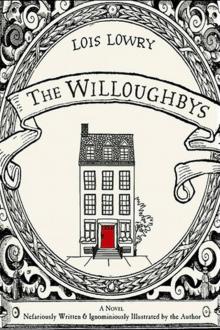 The Willoughbys
The Willoughbys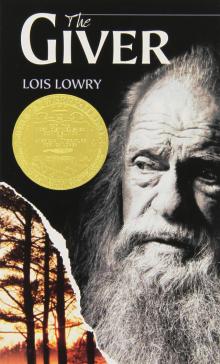 The Giver
The Giver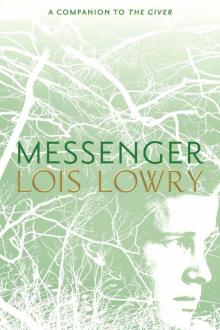 Messenger
Messenger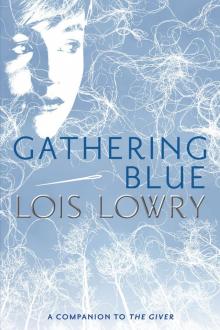 Gathering Blue
Gathering Blue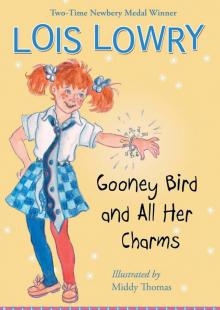 Gooney Bird and All Her Charms
Gooney Bird and All Her Charms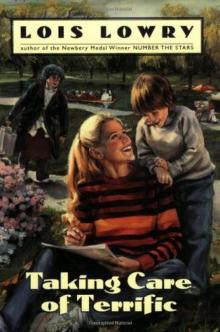 Taking Care of Terrific
Taking Care of Terrific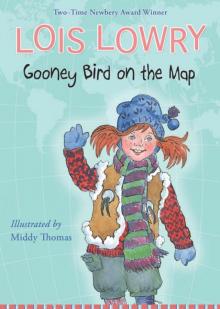 Gooney Bird on the Map
Gooney Bird on the Map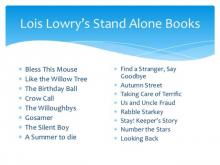 The Birthday Ball
The Birthday Ball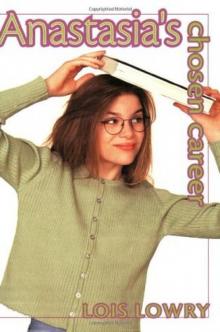 Anastasia's Chosen Career
Anastasia's Chosen Career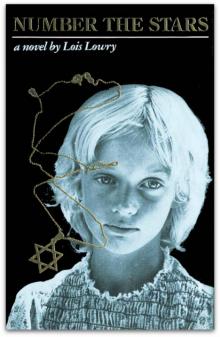 Number the Stars
Number the Stars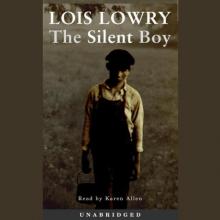 The Silent Boy
The Silent Boy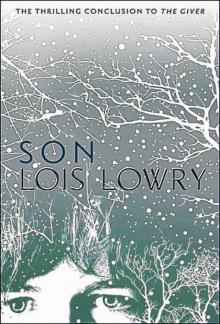 Son
Son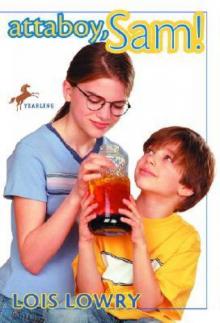 Attaboy, Sam!
Attaboy, Sam!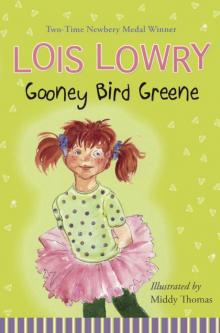 Gooney Bird Greene
Gooney Bird Greene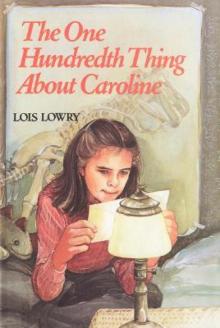 The One Hundredth Thing About Caroline
The One Hundredth Thing About Caroline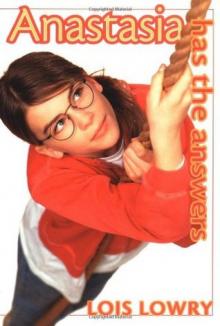 Anastasia Has the Answers
Anastasia Has the Answers Your Move, J. P.!
Your Move, J. P.!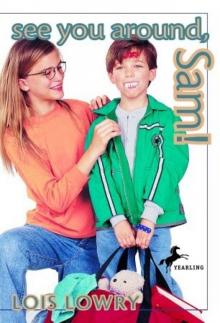 See You Around, Sam!
See You Around, Sam!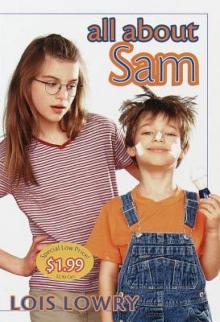 All About Sam
All About Sam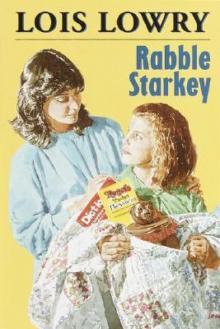 Rabble Starkey
Rabble Starkey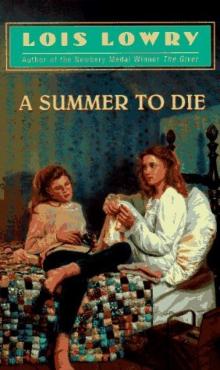 A Summer to Die
A Summer to Die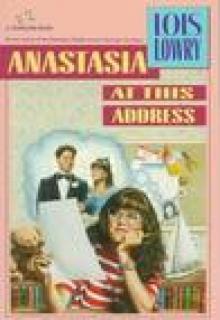 Anastasia at This Address
Anastasia at This Address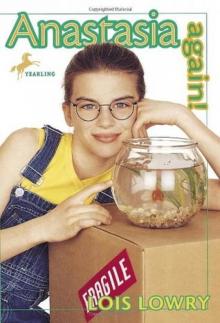 Anastasia Again!
Anastasia Again!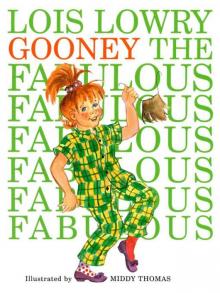 Gooney the Fabulous
Gooney the Fabulous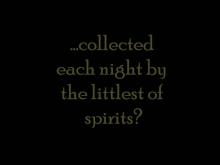 Gossamer
Gossamer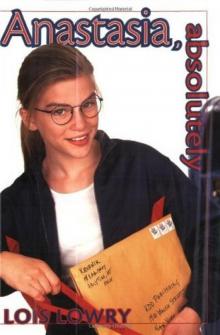 Anastasia, Absolutely
Anastasia, Absolutely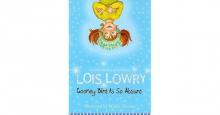 Gooney Bird Is So Absurd
Gooney Bird Is So Absurd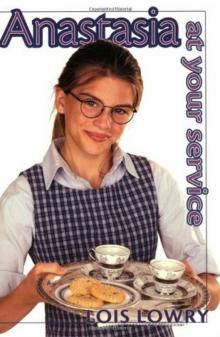 Anastasia at Your Service
Anastasia at Your Service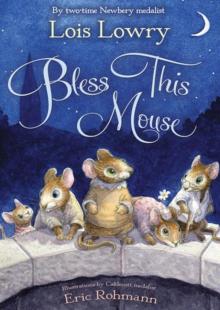 Bless this Mouse
Bless this Mouse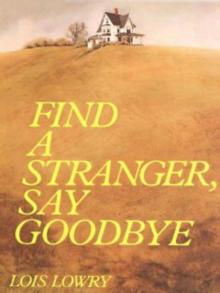 Find a Stranger, Say Goodbye
Find a Stranger, Say Goodbye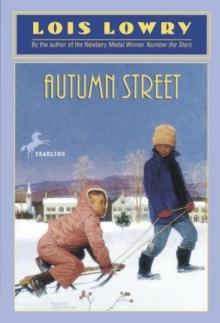 Autumn Street
Autumn Street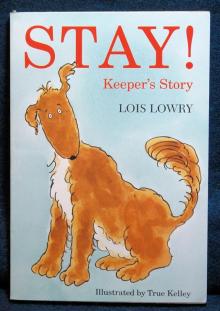 Stay Keepers Story
Stay Keepers Story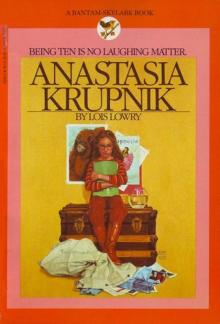 Anastasia Krupnik
Anastasia Krupnik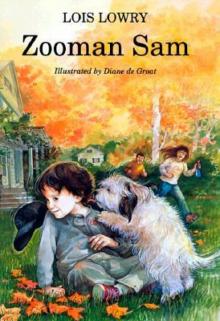 Zooman Sam
Zooman Sam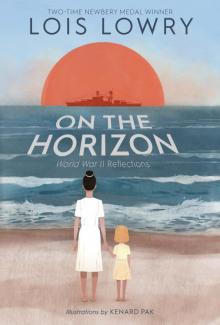 On the Horizon
On the Horizon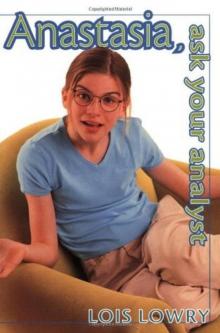 Anastasia, Ask Your Analyst
Anastasia, Ask Your Analyst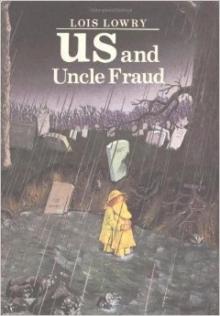 Us and Uncle Fraud
Us and Uncle Fraud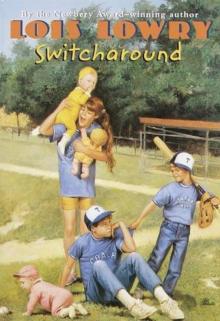 Switcharound
Switcharound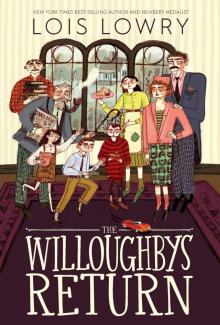 The Willoughbys Return
The Willoughbys Return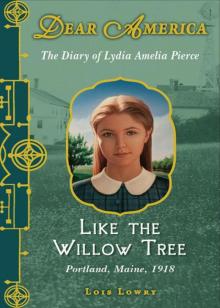 Dear America: Like the Willow Tree
Dear America: Like the Willow Tree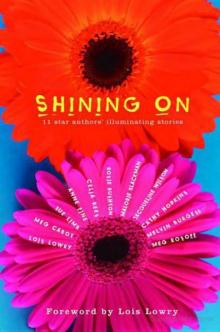 Shining On
Shining On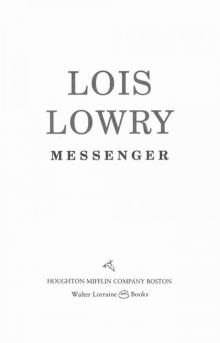 Messenger (The Giver Trilogy)
Messenger (The Giver Trilogy)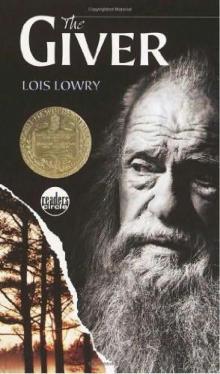 Giver Trilogy 01 - The Giver
Giver Trilogy 01 - The Giver